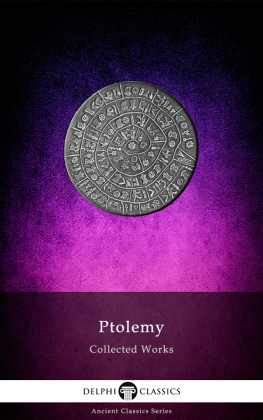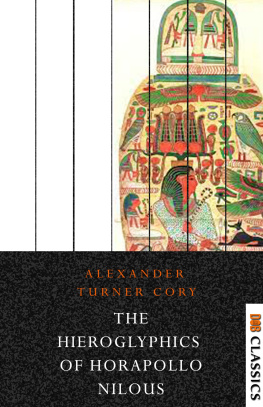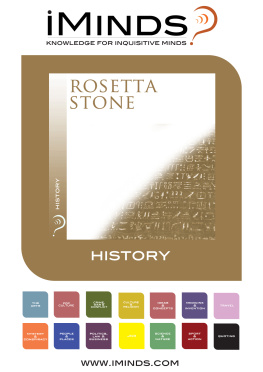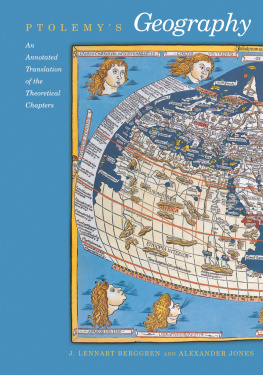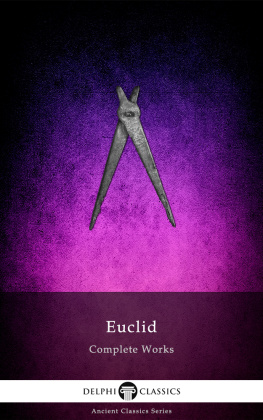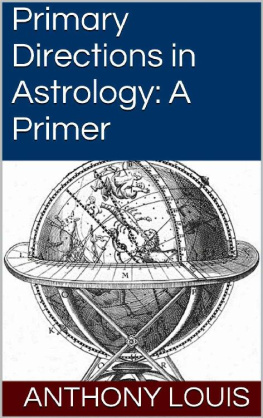Claudius Ptolemy - Collected Works of Ptolemy
Here you can read online Claudius Ptolemy - Collected Works of Ptolemy full text of the book (entire story) in english for free. Download pdf and epub, get meaning, cover and reviews about this ebook. year: 2020, publisher: Delphi Classics, genre: Science. Description of the work, (preface) as well as reviews are available. Best literature library LitArk.com created for fans of good reading and offers a wide selection of genres:
Romance novel
Science fiction
Adventure
Detective
Science
History
Home and family
Prose
Art
Politics
Computer
Non-fiction
Religion
Business
Children
Humor
Choose a favorite category and find really read worthwhile books. Enjoy immersion in the world of imagination, feel the emotions of the characters or learn something new for yourself, make an fascinating discovery.
- Book:Collected Works of Ptolemy
- Author:
- Publisher:Delphi Classics
- Genre:
- Year:2020
- Rating:3 / 5
- Favourites:Add to favourites
- Your mark:
- 60
- 1
- 2
- 3
- 4
- 5
Collected Works of Ptolemy: summary, description and annotation
We offer to read an annotation, description, summary or preface (depends on what the author of the book "Collected Works of Ptolemy" wrote himself). If you haven't found the necessary information about the book — write in the comments, we will try to find it.
Collected Works of Ptolemy — read online for free the complete book (whole text) full work
Below is the text of the book, divided by pages. System saving the place of the last page read, allows you to conveniently read the book "Collected Works of Ptolemy" online for free, without having to search again every time where you left off. Put a bookmark, and you can go to the page where you finished reading at any time.
Font size:
Interval:
Bookmark:

The Collected Works of
PTOLEMY
(c.AD 100c.170)

Contents

Delphi Classics 2020
Version 1

Browse Ancient Classics







The Collected Works of
CLAUDIUS PTOLEMY

By Delphi Classics, 2020
Collected Works of Ptolemy
First published in the United Kingdom in 2020 by Delphi Classics.
Delphi Classics, 2020.
All rights reserved. No part of this publication may be reproduced, stored in a retrieval system, or transmitted, in any form or by any means, without the prior permission in writing of the publisher, nor be otherwise circulated in any form other than that in which it is published.
ISBN: 978 1 91348 724 9
Delphi Classics
is an imprint of
Delphi Publishing Ltd
Hastings, East Sussex
United Kingdom
Contact: sales@delphiclassics.com

www.delphiclassics.com

Alexandria, Egypt possibly Ptolemys birthplace

Translated by Edward Luther Stevenson, 1932
Claudius Ptolemy (c.AD 100-c.170) was a Greek mathematician, astronomer, geographer and astrologer, who lived in the city of Alexandria under the rule of the Roman Empire. Little information survives regarding his origin and life. His Latin name implies he was also a Roman citizen. The fourteenth century astronomer Theodore Meliteniotes gives his birthplace as the prominent Greek city Ptolemais Hermiou in the Thebaid, though there is no other evidence to confirm or contradict this late claim.
Ptolemys Geography is a gazetteer, an atlas and a treatise on cartography, compiling the geographical knowledge of the second century Roman Empire. Originally written in c. AD 150, the work was a revision of a now-lost atlas by Marinus of Tyre, using additional Roman and Persian gazetteers and new principles. Its translation into Arabic in the 9th century and Latin in 1406 was highly influential on the geographical knowledge and cartographic traditions of the medieval Caliphate and Renaissance Europe.
No Greek manuscript of the text survives from earlier than the thirteenth century. A letter by the Byzantine monk Maximus Planudes records that he searched for one for Chora Monastery in the summer of 1295; one of the earliest surviving texts may have been the fruit of his work. Geography consists of three sections, divided between eight books.
Book I is a treatise on cartography, describing the methods used to assemble and arrange the authors data. Book II through to the beginning of Book VII is a gazetteer, providing longitude and latitude values for the world known to the ancient Romans. The remainder of Book VII gives details on three projections to be used for the construction of a map of the world, varying in complexity and fidelity. Book VIII serves as an atlas of regional maps, including a recapitulation of the values given earlier in the work, which were intended to be used as captions to clarify the maps contents and maintain their accuracy during copying.

Early Baroque artists portrayal of Ptolemy
CONTENTS

The Geography of Ptolemy in a 1411 Latin translation by Jacobus Angelus, with 27 maps by Claus Swart
DEDICATED TO
GEORGE F. BAKER JR.
AND
GRENVILLE KANE
WHOSE GENEROUS INTEREST MADE THIS
PUBLICATION POSSIBLE
CLAUDIUS PTOLEMY (ca. 90 168 A.D.) holds a place among the foremost of those who have made contributions to the science of geography. It is not a little surprising that there has never appeared a complete English, German, or French translation of his work in this field, often as his name is to be met with in the literature which treats of the expansion of geographical knowledge and the cartographical records of the same.
In his Introduction Professor Fischer has called attention to the lack of a thoroughly satisfactory edition of Ptolemys Geography, and in the preparation of this translation based upon the generally recognized best Latin and Greek texts, and, it may be further noted, upon the critical texts and studies of Wilberg and Mller, this puzzling fact stands in the forefront of the difficulties with which it has been necessary to contend. No one edition is alone a safe guide.
There are doubtless imperfections in the translation; it, however, has been done with great care and labor. That there is a lack of exact agreement with this or that text will be noted by those who critically examine the translation. With very few exceptions geographical names have been given as in the original Greek or Latin texts. Occasionally the modern English word has been preferred. The intention has been to give that reading which, in the translators best judgment, is a faithful presentation of what Ptolemy intended to set down in his great work. As close an adherence to the original as possible has been the aim, never overlooking the fact that not a few of his sentences, particularly in Book I and also in Book VII, are considerably involved. It has been stated that this fact may have contributed much to deter readers from a critical study of his Geography, particularly of his Book I, but which, of course, must be read to be able to understand the remaining seven.
It is in the field of mathematical geography that Ptolemys fame as a geographer especially rests, into which field he was led through his interest in mathematical and astronomical studies. Herein, it may be stated, his was the most considerable attempt to place the study of geography on a scientific basis, giving to him, therefore, first place among the ancient writers on the subject. Perhaps it is the completeness of his system, as has been noted, that especially contributed to that end. There is in it the appearance of a finality, a complete summing up of what had been contributed by those who had preceded him by Hipparchus, by Eratosthenes, and especially by Marinus. His work is indeed the main foundation of our geographical knowledge of the classical day. The whole of modern cartography has developed from his Atlas.
Next pageFont size:
Interval:
Bookmark:
Similar books «Collected Works of Ptolemy»
Look at similar books to Collected Works of Ptolemy. We have selected literature similar in name and meaning in the hope of providing readers with more options to find new, interesting, not yet read works.
Discussion, reviews of the book Collected Works of Ptolemy and just readers' own opinions. Leave your comments, write what you think about the work, its meaning or the main characters. Specify what exactly you liked and what you didn't like, and why you think so.

